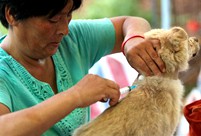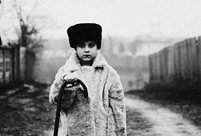

BERLIN, July 2 -- German sinologist and ethnologist Ingo Nentwig has spoken highly of two new books on Tibet written by Luxembourg scholar Albert Ettinger, saying that they help explore the "myth of Tibet" widespread in Western countries.
In a recent written interview with Xinhua, Nentwig, who spent more than one month in Tibet doing field research, said Ettinger's books are "prime examples of educational literature in the best sense" and "can be unreservedly recommended to all that are interested in Tibet."
Nentwig said the two books -- "Free Tibet?" and "Struggle for Tibet" are among the few in the German-language book market that reveal the truth of the history and politics of Tibet.
Most of the books in the German-language market are about religion, mountaineering or tourism, while the rest deal with the history or current politics of Tibet almost exclusively from a point of view more or less close to the so-called "Tibetan government-in-exile," Nentwig said.
In this context, Ettinger, a Luxembourg Germanist and university teacher, "did something that was really long overdue, and that one might have expected of a Tibet specialist," according to Nentwig.
In "Free Tibet?" Ettinger deals with the old, traditional Tibet, as it had been until the failed coup of feudal and clerical aristocracy in 1959.
Nentwig said the author wants to dispel the widespread "Tibet myth" in German-speaking countries, which pictures the old Tibet as a peaceful, harmonious, non-violent and happy society, a kind of paradise of religion and contentment, without stress and bustle.
This image of the traditional Tibetan society, which is far from reality, is widespread "mainly due to the propaganda of Tibet separatists and gullible, ignorant journalists who are willing to redistribute this nonsense," Nentwig said.
"Ettinger has now taken the trouble to evaluate the Tibet literature of the past 200 years...He was able to find and demonstrate convincingly that the truth is not hidden in these books at all," Nentwig said.
"The representatives of the 'Tibet myth' obviously read very selectively and systematically whitewash the facts that they can not deny even with the best will. The many followers who have fallen into the trap of the propagandists do not appear to read the books that they have on the shelf," he added.
The truth was that the old Tibet was "a society dominated by poverty, misery and violence, ruled by a degenerated system of political tyranny, an institutionalized embodiment of systematic injustice and inequality, in other words, a 'hell on Earth,'" Nentwig said.
In "Struggle for Tibet" the author wants to convey to the German-speaking public, where there is very strong sympathy for the Tibetan separatists in exile, a different way of looking at the so-called "Tibet conflict," Nentwig said.
Ettinger focuses on the one hand on the history of Tibet, in order to answer the question whether it is possible to derive the right to national independence; on the other hand, he examines the political campaigns of the Tibetan exiles from 1959 up till now, to answer the question whether it is right to get involved in the so-called "Solidarity with Tibet" campaign, Nentwig said.
In both history and politics, Ettinger "exposes a gigantic web of lies" of the propaganda of the exiled Tibetan separatists and "a gullible, superficial Western audience that is all too willing to let themselves be exploited for their goals," according to Nentwig.
 4-year-old cute 'monk' spends summer holiday in temple
4-year-old cute 'monk' spends summer holiday in temple College graduates shining on the red carpet in Nanjing
College graduates shining on the red carpet in Nanjing PLA soldiers launch guided missiles in confrontation exercise
PLA soldiers launch guided missiles in confrontation exercise One woman’s fight against dog eaters
One woman’s fight against dog eaters Beautiful and smart - post-90s college teacher goes viral
Beautiful and smart - post-90s college teacher goes viral Top 10 luxury houses in the world
Top 10 luxury houses in the world  National Geographic: best photos during journey
National Geographic: best photos during journey Couples who engage in meaningful and deep conversations are happier
Couples who engage in meaningful and deep conversations are happier Maldives resort rated best hotel of 2015
Maldives resort rated best hotel of 2015  Europe can reshape Sino-West relationship
Europe can reshape Sino-West relationship  Decades-old meat sold across country
Decades-old meat sold across country Stock market rebounds after policy boost
Stock market rebounds after policy boost  10 cool places to beat China’s summer heat
10 cool places to beat China’s summer heat Day|Week